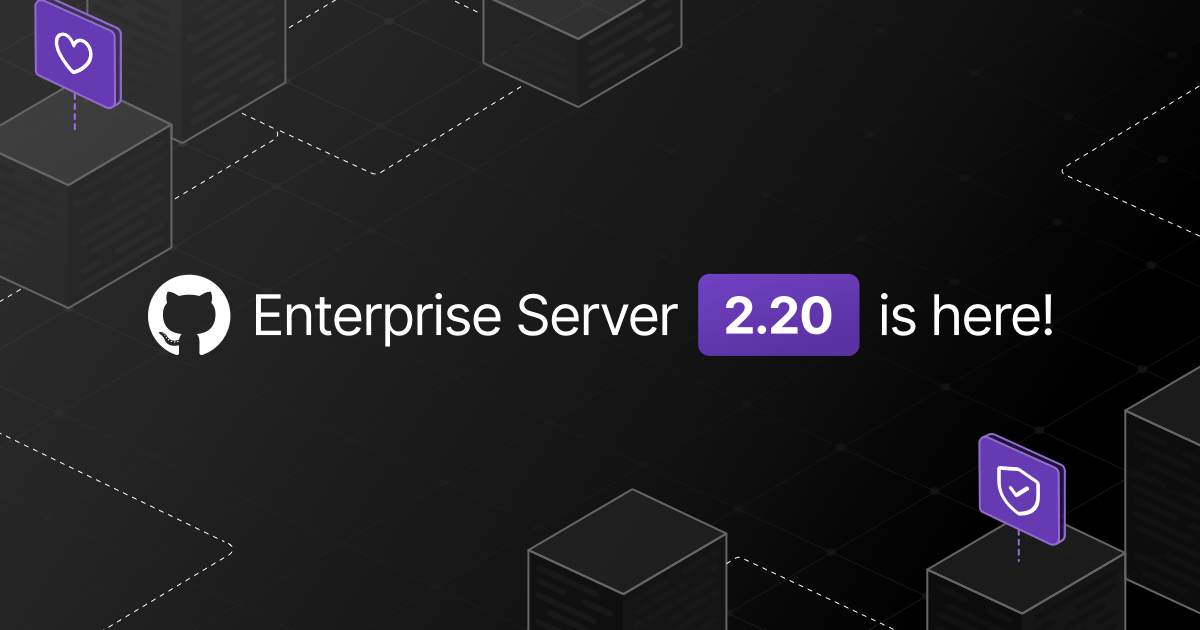GitHub Enterprise Server 2.20 is here
Additional security features, a new internal visibility option, and more with the latest updates to GitHub Enterprise Server 2.20.

GitHub Enterprise Server 2.20 is now available with more security features, along with the usual compilation of performance improvements and bug fixes you’ve come to expect.
Learn more or upgrade to the newest version of GitHub Enterprise Server to take advantage of the latest features.
Expanded branch protection rules
Now, repository administrators can enforce more granular combinations of rules to reject pushes with merge commits and allow for linear commit histories. They can also grant all users with push access with the ability to force-push to and delete protected branches.

Your personal audit log page
Enterprise users are now able to access audit logs on the Security Log tab of their personal settings page.

Internal visibility in GitHub Enterprise Server
On May 23, 2019 we launched internal visibility for repositories under a GitHub Enterprise Cloud account, making it easier to innersource code and projects to organization members while restricting access to outside collaborators.

Starting with GitHub Enterprise Server 2.20, our goal has remained the same. We want to continue to unify the repository visibility experience between GitHub Enterprise Cloud and GitHub Enterprise Server.
In this release, administrators may run an optional migration script to convert all public repositories into internal repositories. This migration is currently optional to help customers test these changes on a non-production instance. Note that this migration will be mandatory in a later release.
When the migration runs in private mode, administrators should expect the following:
- All organization public repositories become internal repositories
- All user public repositories become private
- Forks of public repositories become private forks (with the fork network maintained)
- Creation of public repositories will be disabled (with the option to be re-enabled)
The future of repository visibility
One of our goals for GitHub is to have a consistent experience and feature parity throughout the platform. When it comes to repository visibility, we’re working to have the terms public, internal, and private have uniform meanings regardless of whether you’re a GitHub Enterprise Server user or you’re contributing to open source on GitHub.com. In future releases of GitHub Enterprise Server, we’ll adjust how visibility works so that public repositories mean open source repositories to everyone.
Note that internal repositories are only visible to enterprise members, while private repositories are only visible to assigned users and teams. The optional migration for private mode instances is available for administrators and users in order to limit any potential disruption to their workflow prior to a release where this migration is mandatory. If you’re a GitHub Enterprise Server Administrator, contact your account representative for more information.
Say goodbye to old friends
The addition of new SSH-DSS keys was removed in GitHub Enterprise Server 2.20.0, along with basic password-based HTTP authentication. This functionality will continue to operate via personal access tokens, however. Lastly, support for the legacy Gravatar service was also deprecated.
Not all changes mean you have to say goodbye. Learn about how administrators can now set maxobjectsize to limit the size of commits pushed to a repository, as well as how organization owners can default sets of labels for new repositories. Check out these changes and more in the release notes.
Try GitHub Enterprise for free
Want to innovate and work faster on the platform your team knows and loves without sacrificing the security needs of your business?
Start a free trial of GitHub Enterprise
Tags:
Written by
Related posts

From pair to peer programmer: Our vision for agentic workflows in GitHub Copilot
AI agents in GitHub Copilot don’t just assist developers but actively solve problems through multi-step reasoning and execution. Here’s what that means.

GitHub Availability Report: May 2025
In May, we experienced three incidents that resulted in degraded performance across GitHub services.

GitHub Universe 2025: Here’s what’s in store at this year’s developer wonderland
Sharpen your skills, test out new tools, and connect with people who build like you.